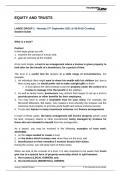Lecture notes
Full Set Equity and Trust Law Notes
- Module
- Equity and Trust
- Institution
- University Of Law (ULaw)
This set covered the whole of Equity and Trust Law (units 1-9) from the University of Law, however could be used by other universities too.
[Show more]



